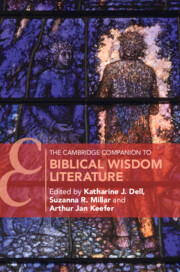Book contents
- The Cambridge Companion to Biblical Wisdom Literature
- Cambridge Companions to Religion
- The Cambridge Companion to Biblical Wisdom Literature
- Copyright page
- Contents
- Contributors
- Acknowledgement
- Abbreviations
- Part I The Context of Wisdom Literature
- Part II Wisdom Literature in the Hebrew Bible
- Part III Wisdom Literature beyond the Hebrew Bible
- 14 Ben Sira
- 15 The Book of Wisdom
- 16 Wisdom at Qumran
- 17 Egyptian Wisdom
- 18 The Syro-Palestinian Wisdom of the Late Bronze Age
- 19 Mesopotamian Wisdom
- Part IV Themes in the Wisdom Literature
- Bibliography
- Index
- Cambridge Companions to Religion
- References
18 - The Syro-Palestinian Wisdom of the Late Bronze Age
from Part III - Wisdom Literature beyond the Hebrew Bible
Published online by Cambridge University Press: 28 July 2022
- The Cambridge Companion to Biblical Wisdom Literature
- Cambridge Companions to Religion
- The Cambridge Companion to Biblical Wisdom Literature
- Copyright page
- Contents
- Contributors
- Acknowledgement
- Abbreviations
- Part I The Context of Wisdom Literature
- Part II Wisdom Literature in the Hebrew Bible
- Part III Wisdom Literature beyond the Hebrew Bible
- 14 Ben Sira
- 15 The Book of Wisdom
- 16 Wisdom at Qumran
- 17 Egyptian Wisdom
- 18 The Syro-Palestinian Wisdom of the Late Bronze Age
- 19 Mesopotamian Wisdom
- Part IV Themes in the Wisdom Literature
- Bibliography
- Index
- Cambridge Companions to Religion
- References
Summary
Noga Ayali-Darshan covers the wisdom works and vernacular sayings of Syria-Palestine from the Late Bronze Age. This material exists in some form of Akkadian, including Sumero-Akkadian and Akkadian-Hurrian, all of which comes from sites at Ugarit and/or Emar. Darshan organises the works into four types: practical wisdom, critical wisdom, disputation poems and fables, and righteous sufferer compositions. Much of her chapter will introduce readers to the texts themselves, by way of their provenance, language and versions. Additionally, some thematic and particular linguistic reflections are given. In short, this chapter provides an introduction to an emerging and perhaps neglected area of wisdom from the biblical world.
Keywords
- Type
- Chapter
- Information
- The Cambridge Companion to Biblical Wisdom Literature , pp. 344 - 365Publisher: Cambridge University PressPrint publication year: 2022

